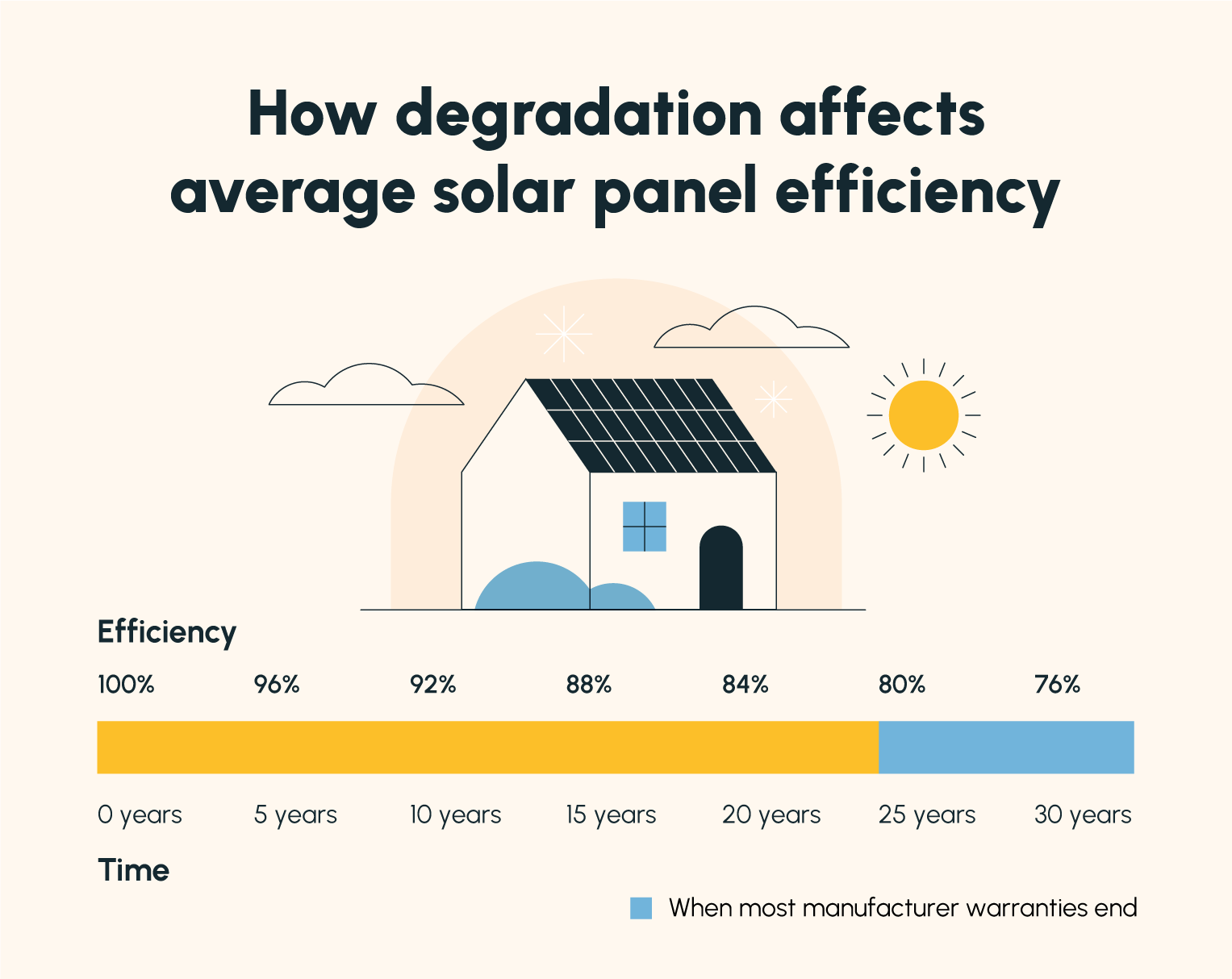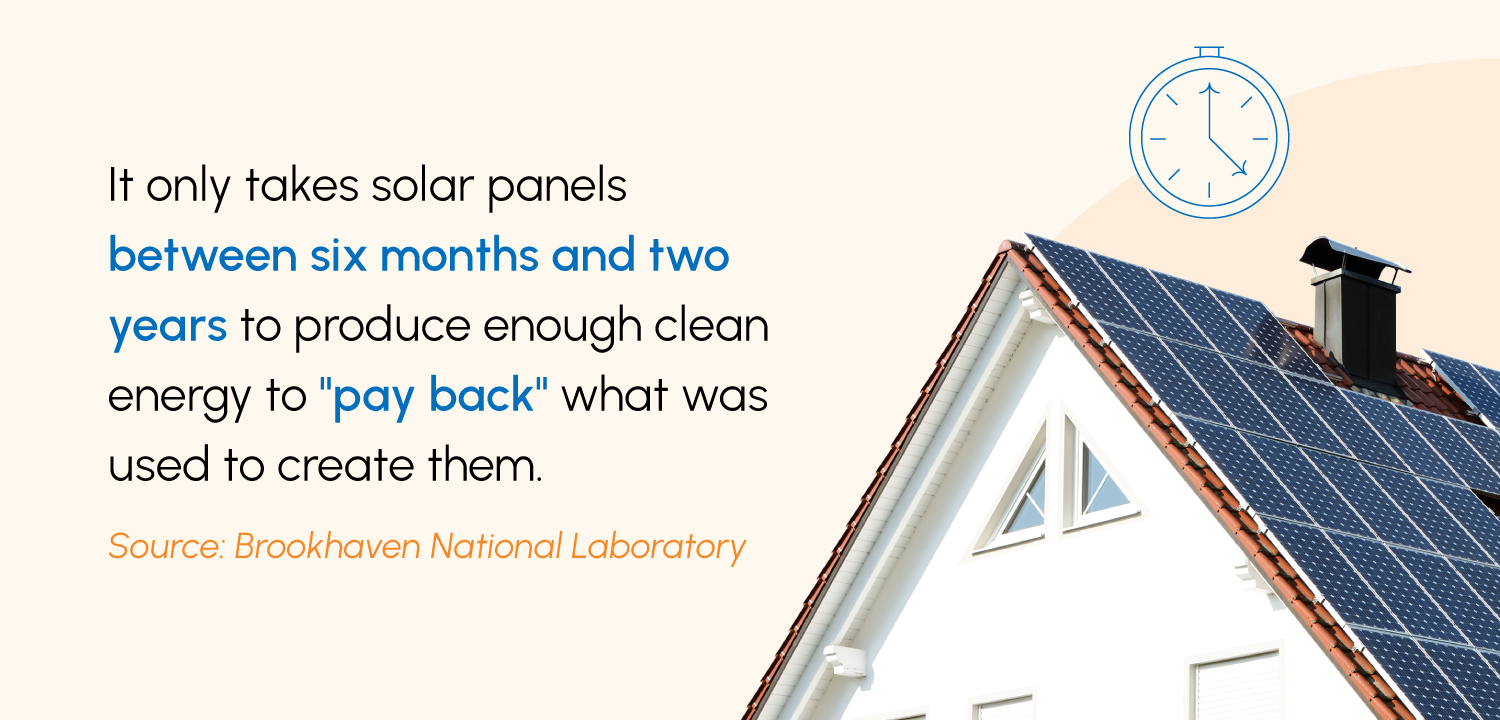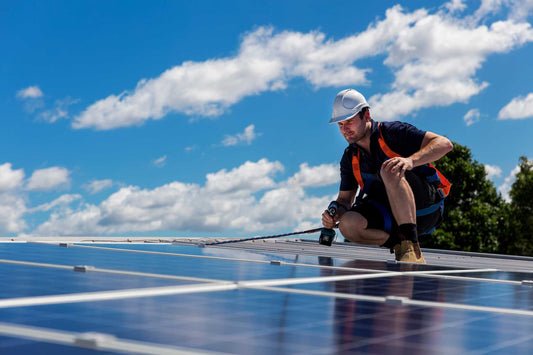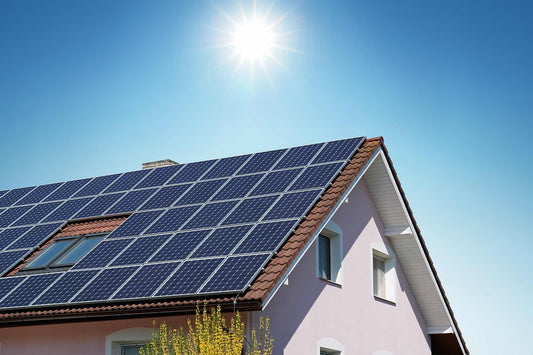On average, solar panels last about 25-30 years. That said, many solar systems will still be producing some energy past this point — production will just be less than optimal.
Solar panels are undoubtedly built to last, but do they last forever?
Investing in a solar panel system is a long-term commitment, so it’s natural to pose the question “how long do solar panels last?” before jumping into the deep end.
Here’s the short answer — solar panels last for an average of 25-30 years. Read on for a detailed breakdown of solar panel lifespan as well as some tips to help you get the most out of your solar system.
The Solar Panel Lifespan Explained
Typically, when discussing the lifespan of solar panels, most solar providers are referring to their “useful life.” Useful life is the span of time that solar panels produce energy efficiently — beyond this point, their rate of production is significantly reduced.
The average useful life of solar panels is 25-30 years. By this point, most panel warranties will have expired and equipment will likely become less efficient and more prone to malfunction. This is due to a phenomenon known as solar panel degradation, which we’ll unpack in the following section.
What Is Solar Panel Degradation Rate?

Solar panel degradation rate refers to the percentage that solar panel efficiency declines each year following installation. In other words, it’s the reason why — any external factors aside — solar panels don’t last forever.
The average degradation rate of solar panels is 0.8% per year, meaning by year 25, most solar panels will be operating at about 80% of their original efficiency.
That said, this number can be higher or lower depending on panel quality. Some panels (including many newer options) boast degradation rates of only 0.5%-0.3%, making their efficiency at the 25-year mark between 87.5% and 92.5% of their initial efficiency.
| Degradation rate | ||||
|---|---|---|---|---|
| 0.3% | 0.5% | 0.8% | ||
| Years | 10 years | 97% | 95% | 92% |
| 20 years | 94% | 90% | 80% | |
| 30 years | 91% | 85% | 76% | |
Calculating projected production following solar degradation is simple — just multiply your panel degradation rate by the number of years you’re wondering about, then subtract that number from 100. This number is the efficiency percentage of your panels after however many years you chose.
When shopping for solar panels, be mindful of each brand’s warranty length. This is a good indication of how long the manufacturer anticipates its panels will operate efficiently. The longer the warranty, the longer a manufacturer expects the panels to last.
Factors Contributing to Solar Panel Degradation

Solar panel degradation occurs regardless of external forces. That said, there are some factors that speed up the degradation process, which we describe below.
System Quality
Not all solar panel systems are of the same quality. Some are more efficient and durable than others, each boasting different efficiency ratings and degradation rates.
Investing in a high-quality system with a great warranty may cost a bit of a premium, but it’s well worth it in the long run. By investing in the best solar panels for quality, you can count on a higher ROI.
Quality of Installation
If your panels are installed poorly, whether that be due to malfunctioning brackets, exposed wiring, or other mishaps, your panels will be more susceptible to damage. This can increase degradation rate and shorten the lifespan of your panels.
Extreme Weather
Modern solar panels are highly durable and have been rigorously tested by manufacturers to ensure they can withstand most weather conditions.
That said, if you live in an area prone to hostile weather conditions, a heavy hailstorm may leave a dent or crack in your panels’ tempered glass, damaging them and causing them to deteriorate. Heavy snowfall can also potentially pile up and cause some damage to your system’s structural integrity.
Temperature
Sunlight is necessary for solar panels to function, but extreme heat can actually decrease panel efficiency. If you live in a hot climate, consider installing brackets that elevate your panels enough to maximize airflow and keep them cool.
How to Extend the Lifespan of Solar Panels
While the above factors may pose a bit of a challenge to keeping your panels fully functional, you aren’t entirely powerless against them. The following tips will help you improve your solar system’s lifespan.
Do Your Research Before Installation
Many issues with panel degradation can be curbed by doing plenty of research before choosing your components and installing them.
First and foremost, remember to choose a provider that offers a good warranty — ideally one that lasts a full 25 years. All of Solartap’s panels offer a 25-year warranty, so you can feel confident in their long-term efficiency, no matter which brand you choose.
When the time comes to install your panels, be sure to discuss your needs with your solar installer. Confirm that they’re installing your panels to face the best direction possible, and if you live in a hot climate, ask about installation options that improve airflow.
That said, as long as you hire a reputable professional to complete your installation, you shouldn’t have to worry about installation quality. If you plan to pursue a DIY installation, however, remember to do plenty of research in advance.
Have Your Panels Checked Regularly
Although most solar panels don’t need regular maintenance, it’s a good idea to occasionally (but consistently) have a technician check them for any efficiency issues.
Many systems offer virtual efficiency tracking capabilities so that you or your installer can identify any issues without scaling your roof and physically inspecting the panels. If you identify an issue that appears to be due to damage or malfunction, contact a technician to help.
Protect and Clean Your Panels
As previously mentioned, solar panels are very durable. That said, falling objects can cause damage. Be mindful of any branches that could drop heavy objects (such as pine cones) onto your panels, and trim them if necessary.
Debris can also block the sun’s rays and inhibit panel efficiency. Be sure to periodically clean off any dirt, leaves, or other plant matter that collects on your panels.
Solar panels also provide shade that attracts animals during warmer seasons. As cute as your local critters may be, they can cause damage to solar panel wiring and other components. Consider investing in bird or critter guards to prevent any unwanted guests from nesting under or around your panels.
Carbon Footprint of Solar Panels
It’s common knowledge that solar energy is a clean and renewable energy source, but what exactly does that mean? Do solar panels produce any pollution?
The Bad News: Electronic Waste
Like any technology that has a shelf life, solar panels eventually lose function and must be decommissioned. When that happens, the expired panels need to go somewhere.
At the moment, solar panels are difficult to de-manufacture and recycle at a mass scale, and there isn’t an established recycling program for them in the U.S. For this reason, solar panels often add to electronic waste.
The Good News: Recycling Initiatives & Energy Payback Time

Despite existing challenges with solar panel electronic waste, the carbon footprint of solar panels is far from bleak.
It is projected that the U.S. will have a solar panel recycling initiative similar to the European Union’s Waste Electrical and Electronic Equipment Directive within the coming decade. This means that solar panels installed today are almost guaranteed to be recyclable by the end of their lifespan.
Moreover, solar panels’ 25- to 30-year lifespan beats out their energy payback time (EPBT) significantly. EPBT refers to how long it takes solar panels to produce enough clean energy to make up for the energy used to manufacture them.
An analysis from Brookhaven National Laboratory determined the EPBT of solar panels to be between six months and two years. This means that by this time, solar panels will have already generated enough clean energy to pay back the energy costs that went into producing them.
In short, solar panels leave a net positive impact on the electric grid.
Solar Panel Lifespan FAQ
A solar system is a big investment, so the useful life of solar panels is a very important consideration. Below, we answer some common questions about solar panel lifespan.
Do Solar Panels Wear Out or Last Forever?
Solar panels are built to last for a very long time, but they do have a “useful life” and wear out eventually. On average, solar panels last for 25-30 years.
How Often Do Solar Panels Need to Be Replaced?
Since solar panel efficiency usually deteriorates after 25 to 30 years, it’s typically recommended to replace panels around this time. That said, there are several factors that go into the appropriate timeline to replace panels, including:
- Length of the manufacturer’s warranty
- Panel efficiency and degradation rate
- Panel upkeep
- Owner’s satisfaction with output over time
What Happens to Solar Panels After 25 Years?
Most manufacturers promise that their panels will operate efficiently for 25 years. Solar panels don’t suddenly stop working after 25 years, but at this point the average solar panel will be operating at about 80% efficiency.
Do Solar Panels Need to Be Cleaned?
Solar panels don’t need to be cleaned regularly, but doing so will prevent dirt and debris from collecting and inhibiting energy production. If you notice any large branches or piles of leaves on your panels, it’s a good idea to remove them.
If you don’t feel totally confident in your ability to scale your roof to clean your panels, it’s a good idea to recruit help from an expert.
The best way to keep your solar system functional and efficient is to do plenty of research beforehand. All of Solartap’s panels include 25-year warranties so you can feel confident that you’re getting durable, efficient, and long-lasting panels.
Explore our assortment of highly efficient panels today.




